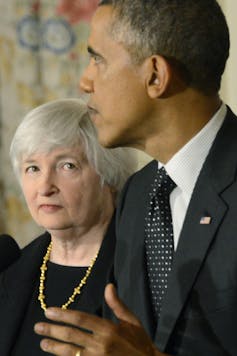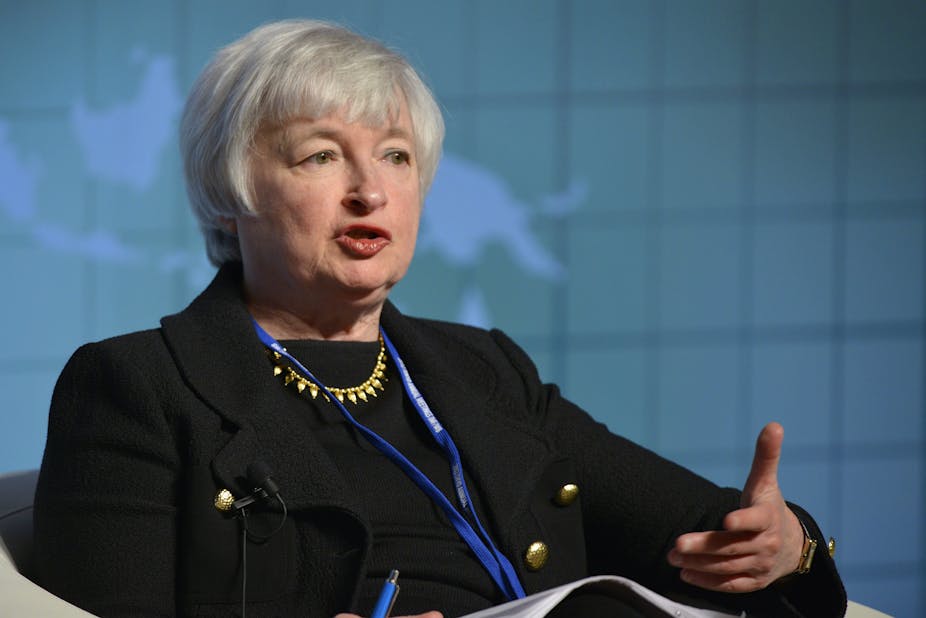If endorsed by the US Senate, Janet Yellen is set to become the first woman to head the US Federal Reserve, the most powerful central bank in the world. She’ll replace the current chairman Ben Bernanke, whose term ends on January next year.
Yellen is neither a Wall Street darling, nor a political insider. But she’s had more experience at the highest levels of the Federal Reserve system than nearly anyone else.
Yellen served for three years as the vice chair of the Fed. Before that, she headed the San Francisco Fed for six years, chaired the Council of Economic Advisors for two years and completed three years as a member of the Board of Governors.
But despite her long-running involvement, the question everybody’s asking is whether we’re going to see major shifts in monetary policy under her leadership?
A concern for jobs over rising inflation
The Fed has the dual objective of ensuring economic stability as well as price stability. Economic stability involves stable unemployment rate and growth of economic activities. And price stability means keeping inflation rate fairly constant – set at a pre-committed level.

A growing economy shouldn’t see rising unemployment, giving the Fed room to focus on keeping inflation in check. But Yellen will inherit an economy that is undergoing a painful and slow recovery after the global financial crisis. Unemployment still hovers around 7.3%.
And she enters the job when the Fed is taking an unprecedented role in stimulating the US economy, buying $85 billion of US bonds every month to keep interest rate low in the hope of keeping the economic recovery on track. The possibility of rising inflation is less of a concern for the Fed.
One of the main architects of the $85 billion dollar a month bond buyback program, Yellen emphasised “maximum employment” as the main goal of the Fed for now.
Low rates for now
For the next year or so, it seems that Yellen would focus on keeping the interest rate low to allow full recovery of the US economy. Her induction as the Fed chairman would bring a policy continuation, much to the relief of the market.
As the Fed’s vice chairman, she has been a strong advocate of the set of unconventional policies such as quantitative easing. So the Fed’s current program of buying Treasury and mortgage-backed securities, in an effort to push long-term interest rate down, would continue.
This is good news for metal exporting countries like Australia. Easy money policy supports metal prices in several ways, since low interest rates tend to weaken the US dollar. And a lower US dollar would create incentives to hold more metal futures than US bonds, benefiting metal exporters. The Aussie dollar would also continue to hold up against the US dollar, at least in the foreseeable future.
Regulate the banks
Yellen’s preference for rule-based policies is well known in the Fed circles. In the mid-2000s, before the financial crisis, Yellen, like the current chairman Ben Bernanke, was a vocal supporter of setting an explicit target for inflation to reduce uncertainty faced by the market.
She favours regulation instead of using policy to prevent asset market bubbles. And she thinks the financial sector, including the “shadow banks” that exist outside the current regulatory structures, should be regulated through tough capital requirements, and other deterrents to dangerous risk-taking.
These views mark a clear departure from the financial deregulation in the Greenspan-era, and for good reasons. After all, few disagree that the recession of 2008 has been a result of the Greenspan era deregulation. Yellen’s views would be comforting to the global economy.
Her appointment on Wednesday falls as the US edges closer to October 17, the date it is expected to hit the debt ceiling. If the impasse between Democrats and Republicans in the Congress is not resolved, the US government will start defaulting on its commitment to repay its bond holders, eroding the credibility of the US treasury as well as the US dollar, creating new uncertainties around the world. It will be a test indeed for Janet Yellen.

